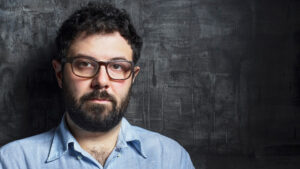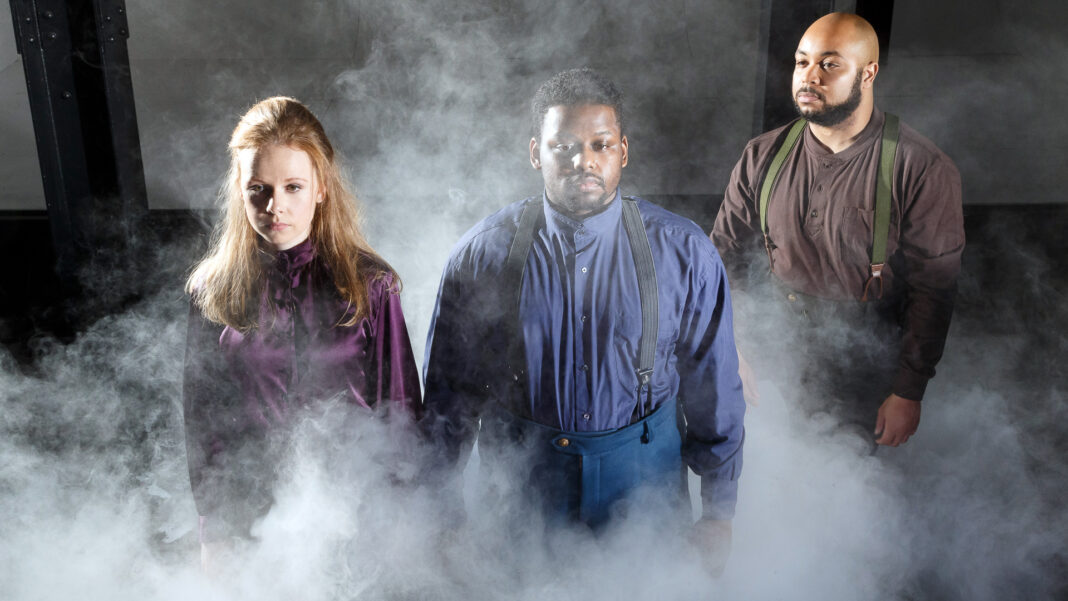Ryūnosuke Akutagawa may not be a household name. But if you know the classic film Rashomon by legendary filmmaker Akira Kurosawa, you know at least one of Akutagawa’s stories. It’s a story about shifting perspectives on a single criminal act. It’s also a story that can be told by more than one or two storytellers. Enter composer Christopher Cerrone and librettist Stephanie Fleischmann. They were inspired by this same story to create a new opera, In a Grove, that has its world premiere this weekend at Pittsburgh Opera. The production is directed by Mary Birnbaum.
Cerrone was a Pulitzer Prize finalist for his opera, Invisible Cities, which was performed in Los Angeles by The Industry and directed by Yuval Sharon. He’s composed works that have been performed by the opera singer Sasha Cooke, violinist Jennifer Koh, the Los Angeles Philharmonic, Wild Up and more.
Fleischmann has written libretti for The Long Walk, After the Storm and The Property. She has multiple new projects in the works including collaborations with Julia Adolphe, Anna Clyne and Dawn Upshaw. She’s also a playwright and dramaturg whose work has been seen in venues around the world.
Adapting Akutagawa’s short story (also titled In a Grove) is the first collaboration between the two. A few weeks ago, as rehearsals were about to get under way, I spoke via Zoom with Cerrone and Fleischman. What follows are excerpts from that conversation that have been edited for length and clarity.
Let’s start where conversations about new operas usually do and that is with the lyrics of Don Henley of The Eagles. He wrote, “There’s three sides to every story baby: yours, mine and the cold hard truth.” What is your definition of the truth and how does that find its way into In a Grove?
Fleischmann: It’s a great question. When we started we were really very much in the Trump era and that was informing our work at the time. That kind of reality has shifted somewhat. So even though there are huge questions about truth in our culture, I think that the piece became a sort of response to that shift and became more about personal and subjective truths as opposed to manipulation of facts to some extent.

Cerrone: I’m really hesitant to tie it to any kind of specific political figure because I think that’s a simplified narrative. I actually think that the whole point of the piece is to avoid simplified narratives. So what I would say is that it appealed to me early on because I was originally interested in doing a piece where multiple perspectives were brought in because a lot of my favorite literature all stems really from this story.
In my opinion, society has shifted away from simpler uncomplicated truths in favor of simple dishonest truths and I think that is not something that can be reduced to any kind of political party ideology. I think most people are asked to make an innumerable number of extremely exponentially more complicated moral decisions in our world. Therefore, I’m not surprised that there’s a tendency towards some kind of simplification urge. I think that is very directly related to that fact that it can be very easily exploited. And I think that that is sort of where we are now.
The short story is only seven pages long. What inspired the changes from the original story to what you present in In a Grove?

Fleischmann: We started talking about the fact that this was a Japanese story and the three creative forces behind it were not Japanese. What would happen if we took it out of Japan and set it somewhere that was more culturally resonant to us? Especially in terms of the issues of what happens to the woman and the relationship between the man and the woman. And the notion of shame which is really very embedded in Japanese culture in a way that I couldn’t begin to understand or none of us could really. So we started thinking about where we might set it and when. We were interested in the year that Akutagawa wrote the story which was 1921 as a possible moment in time. Which, ironically, is soon after the influenza pandemic.
Cerrone: Not only is this work a masterpiece, but it’s also adapted into a film that is also separately a masterpiece. I don’t think it’s necessary to do a straight telling of the story. We’re not Japanese, so it’s not going to be in Japan. We wanted to keep the connection to Japan, but also bring it to America. And the other question was do we need another opera centering around rape? I think what the story really became at that moment was this idea of a story not about literal truth. That was already a sign that the story was going to shift based on just who we are as artists.
Fleischmann: I think that just choosing to set it in 1921 as opposed to today says a lot. What we were really interested in were these people and how these people struggle to communicate or not communicate or manipulate each other and what the repercussions are of human flaws. Taking it away from now allows us to focus on that.
Given that multiple perspectives are presented in this story, does the music became a kind of variations on a theme?
Cerrone: Very much so. I remember Beckett talking about this and also Martin Feldman talking about this idea of deliberately trying to forget and then rewriting something so that you don’t consult the original material. It’s just in your memory and then you try to reconstruct it. I tried to use the memory process itself as a form of variation. So there are these elements that are quite prominent that do come back, but they’re rewritten without consulting the earlier material. I tried to remember what it was and sort of allowed the fallibility my memory to just sort of guide a lot of that.
Fleischmann: We also structured the libretto that way, too. First there was a draft or four drafts and then the fifth draft. We were really working hard at making those moments that were somewhat repeating something that happened before, but they were slightly different.
This is your first collaboration with each other. What have you learned from this process that will inform what you do either separately or together in the future?
Cerrone: Be nice to your collaborators because sometimes it’s really hard.
Fleischmann: I think that the process of evolving what we were making we did so collaboratively. I think that is incredibly valuable. I hope that it shows in the cohesiveness and organic-ness of of the work. It takes an incredible amount of patience and pliability, but also rigor and respect and and what happens is we all have different strengths. So if we can be open to those different strengths then we’re really building something incredibly strong. That’s the goal.
Cerrone: Someone said, your first opera why did you not work with a librettist? And I said I wasn’t emotionally mature enough because it’s really hard to collaborate. And I give Stephanie a lot of credit for her clever person skills. I think it involves an enormous amount of trust in the process and that can be really, really hard sometimes. It’s taught me that real collaboration is possible and I know for a fact that this work, to me feels, like greater than the sum of its parts as a result.
To see the full interview with Cerrone and Fleischmann, please go to our YouTube channel here.
In a Grove will be performed at Pittsburgh Opera on Feb. 19th, 22nd, 25th, 27th & March 1st and 3rd. For tickets go here.
Cerrone did reveal that there were plans to livestream In a Grove after its premiere. We’ll update you with details.
Photo: Madeline Ehlinger, Andrew Turner and Yazid Gray in In a Grove (Photo by David Bachman Photography for Pittsburgh Opera)











